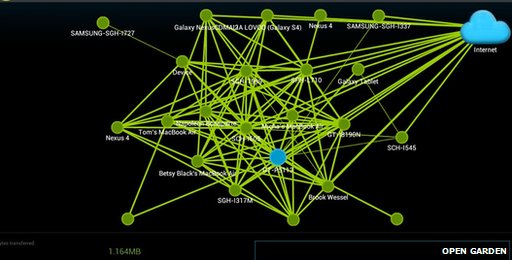Ducking Censorship: There’s an app for that

Internet and mobile technology have become a part of everyday life for most around the world. As smartphone access to the internet expands it’s no surprise then that the number of mobile apps on the market has also grown rapidly in recent years, reaching close to 1 million that can be downloaded on both iPhone and Android devices. One of the most interesting new ones is Open Garden’s FireChat app, which aims to make the Internet more reliable by bypassing existing networks and internet service providers. Since its launch in March, the app has gained two new users per second and several thousands of installs a day. Here’s why.
Micha Benoliel, the CEO and cofounder of the startup Open Garden, developed the FireChat app to allow all devices, including smart phones, tablets and laptops to work together to create a mesh network through which to access the Internet at any time. Now for many, the term mesh network may be new, but the general concept is one that most of us are familiar with. This is how it works.
In the absence of an outside Internet connection, the Open Garden takes advantage of two features commonly found in cell phones today: Wi-Fi and Bluetooth. Much like a bicycle wheel, where multiple spokes connect to a central hub, a mesh network allows multiple devices to connect to a single Internet connection. Each device on the network functions like a hotspot, allowing other devices within a range of 100 feet to connect to it and gain Internet access. What this means is that messages can be passed between devices connected to the mesh network without each device having to establish its own Internet connection. The advantage of this decentralized network is that users can keep their conversations concealed from prying eyes and surf the Internet under the raider. The disadvantage however is that users are not able to send messages to specific people because communications sent on the mesh network are visible to everyone connected to it.
Installing Open Garden is quite straight-forward, although getting it to work properly is not without its challenges. It took a colleague and me nearly an hour to tether a laptop computer to an Android phone that was connected to the Internet using FireChat. If you’re patient and curious enough to see this app at work like we were, you’ll find that the app will eventually run quietly in the background, managing connections between devices with the help of Bluetooth. When you look at the app on your smartphone screen, you’ll not only be able to see all the devices around you that are also running Open Garden, but see how each is connected to the Internet (either directly or through another person’s connection).
Although Firechat’s founder Micha Benoliel developed the app to enable gaming and entertainment (the two categories with the largest market share of applications available for download on iPhones and Androids) it has been used to enable more than just fun and games. For instance, when faced with the threat of internet restrictions and limited cell coverage, more than 100,000 demonstrators in Taiwan hit the streets to protest a trade agreement with China. They turned to FireCchat to keep their lines of communication alive and to mobilize their supporters. Similarly, in light of increased censorship being imposed in Baghdad, an estimated 40,000 users downloaded the mesh chat application in Iraq, making it the country with the second highest number of FireChat users next to the U.S.
While many analysts speculate that the Open Garden app will likely resonate more with consumers in emerging mobile markets like Africa, where incomes are low and fewer people have cell phones, these projections should be tempered with the fact that Internet usage is strongly correlated with income (generally, the higher a country’s GDP per capita, the higher its percentage of Internet users) and smartphone ownership is more common in countries with higher levels of per capita income (traditional cell phones still outnumber smartphones in many parts of the world).
While there’s no doubt that FireChat has the potential to contribute to democracy promotion and Internet freedom, among other things, one of the greatest challenges facing the application is scaling up and gaining a critical mass of users. In theory, Open Garden would need a 7-8% penetration ratio in urban areas to enable users to stay connected to the Internet 93% of the time. With that said, given the importance of peer-to-peer communications particularly in closed societies or countries with minimal communications infrastructure, there’s no doubt that FireChat has the potential to reach this target, although not presumably without attracting attention from governments and law enforcement agencies keen to monitor traffic going to this kind of off-the-grid network. With many of NDI’s partners working in closed societies, apps like Open Garden can play a role in supporting activists who are mobilizing for democratic change.
